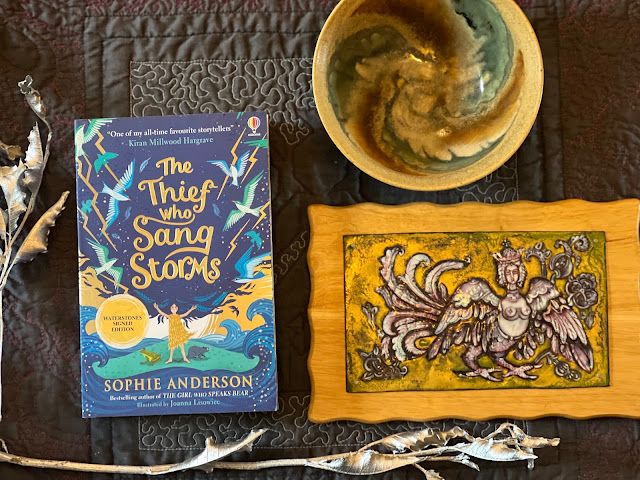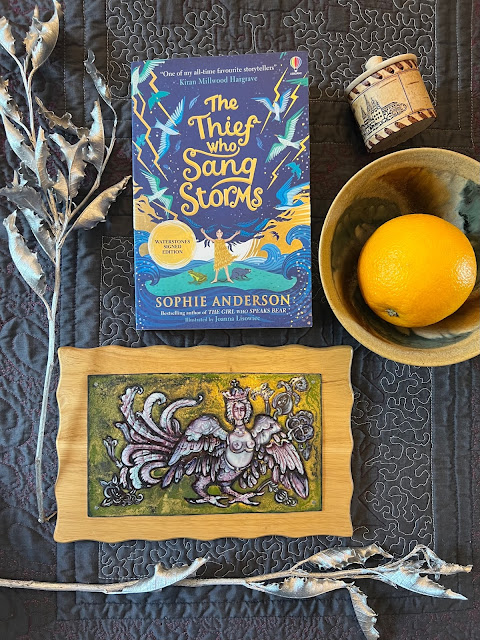"It's been three years since my tenth birthday - when my magic should have arrived and yet didn't. But I know when it does come, I will sing a storm that will change the landscape of our lives once more".
The Thief Who Sang Storms by Sophie Anderson is an engrossing, deeply atmospheric middle grade/YA story, which will appeal to readers of all ages.
"The Island of Morovia is shaped like a broken heart. The humans live on the calmer side of the island, and the alkonosts - the bird-people - live on the stormier side. But it wasn't always this way".
Thirteen-year-old Linnet and her father Nightingale have been living in the Mournful Swamp for the last three years. They are alkonosts, and like all alkonosts, they are banished from their home. Three years earlier a tragedy shook the island. It was the Day of Union when Joy, the ship which carried two queens of Morovia, the human and the alkonost, with their courtiers and VIPs, sank during a tidal wave of epic proportions.
Rather than being united in grief and comfort each other, the humans under the leadership of Captain Ilya, accuse the alkonosts of misuing their singing magic and bringing death to the island.
Linnet is missing her old home, friends and living next to the humans. She is hoping that one day when her magic comes, she would be able to bring two hostile sides together.
The alkonosts are living in the swamps, and those who dare to rebel, are taken to The Keep, the equivalent of GULAG on Morovia, with intolerable working and living conditions.
"There is a Unity Movement that fights for change. I know that one day soon I will help it succeed, because my name, Linnet, is a kind of prophecy, given to me through an ancient tradition of using singing magic to glimpse a child's future".
Nightingale is involved in the rebel movement, stealing from the travellers to contribute to the cause.
"The treasures I steal also fund secret missions... they aim to remove Captain Ilya from power and build unity between alkonosts and humans, so that we can work towards living happier lives together".
When Nightingale is caught by bogatyrs and taken to The Keep, Linnet follows him, hoping to set him free. "I can't let the bogatyrs take Nightingale away. I'd be lost without him, and he'd be lost without me. We need each other."
Will Linnet's mission to free her father, remove Captain Ilya from power, free everyone in The Keep and the quarry and unite all of Morovia succeed?
The main plotline is interspersed with the memory chapters, which give glimpses into the past events and explain the current predicament of the islanders.
Linnet doesn't fight for freedom alone. Her human and alkonost friends will help her along the way. Linnet's animal friends, the swamp-rat Whiskers and toad Lumpy, are as important to her as her family.
I predict that one day someone will be writing a thesis on the importance of animal friends in Sophie Anderson's books. All her characters have animal/bird companions, fiercely loyal, loving and affectionate. As Linnet says about Lumpy, "He's not a pet. We're friends".
It was lovely to meet Baba and baby Marinka from The House with Chicken Legs again. As Marinka is still a baby here, this makes The Thief the prequel to The House time-wise. I love it when the House moves from one book to another, and we meet Marinka at different stages of life.
It's fascinating to see how Sophie reverses some of the perceptions of the Slavic folk tales and its heroes and villains. Solovei the Robber, the infamous monster, who is part-human, part-bird, whose whistle would slay the unsuspecting travellers, is the Nightingale of the story, a melancholic and even tragic character, who grieves the loss of his wife and takes care of his only child.
As Sophie says in the Author's notes, "He was cast as a villain in the poem, but of course we know the villain of one tale might be the hero of another".
The image of Nightingale is an important vessel of the theme of grief, and how we cope or not cope with it.
Ilya Muromets is one of the epic knights (bogatyrs) of the Kievan Rus, who serves Prince Vladimir the Fair Sun and defends his people from numerous attacks. In the legends (byliny) he is portrayed as a leader of spiritual strength and integrity. Sophie re-imagines Ilya as a deceitful haughty man who abuses his power.
"Captain Ilya has hundreds of bogatyrs enforcing his rules now, and there must be hundreds more humans who support him in other ways - by following his orders, or simply doing nothing and ignoring what is happening to alkonosts... While humans are allowing such cruelty to happen, how can unity between is be possible?"
Morovia is one of the Three Floating Islands, drifting across the oceans, moving towards and away from each other. While we get distant glimpses of Eldovia and Buyan, as readers, we do not travel to reach them. I would have liked to see these islands too (in The Thief no.2 perhaps?).
Sophie Anderson is a writer with a unique, distinctive voice.
Reading this book was a mixed bag of emotions. Sophie is an immensely talented, creative storyteller, who knows how to pull your heartstrings. But the comparisons with the current war are inevitable, and there will be no happy end to either side in real life.
The utopian ending puts emphasis on forgiveness and tolerance, understanding the motivation of your enemies/opponents, humanity and compassion.
The Thief Who Sang Storms is a beautiful, sensitive story of love and loss, grief and forgiveness, magic and power of hope.



No comments:
Post a Comment